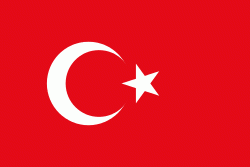Lapseki (Lâpseki İlçesi)
Lapseki (from Greek: Λάμψακος, Lampsakos) is a town and district of Çanakkale Province, Turkey. In 2012 it had a population of 10,863. The mayor is Eyüp Yılmaz (AKP).
The district of Lapseki is known for its cherries, and a cherry festival is held annually in the town.
The town was founded by Greek colonists from Phocaea in the 6th century BC. Soon afterwards it became a competitor of Miletus, controlling the trade routes in the Dardanelles. The modern Turkish name derives from the original Greek name.
Lapseki was founded about 500 BC, one of 4 settlements along the Dardanelles at that time. In ancient times, while the city was under the rule of King Mendrom and named Pityausa, the king, who defended the colonists from Foça from the attacks of the local people, minted coins for the first time in its history in the name of his daughter Lapseke and later the city was given this name by the colonists to express their indebtedness to him. In this way, the name Lampsakos, then Lapseki, was passed down to the present day.
The city was under the Byzantines for a long period before being passed into Ottoman hands after its conquest by Süleyman Pasha in 1356. Occupied at the end of World War I, the town was freed from the British and French forces on 25 September 1922, toward the end of the War of Independence. In the district are the graves of 15,000 soldiers who lost their lives during the War of Independence.
The district of Lapseki is known for its cherries, and a cherry festival is held annually in the town.
The town was founded by Greek colonists from Phocaea in the 6th century BC. Soon afterwards it became a competitor of Miletus, controlling the trade routes in the Dardanelles. The modern Turkish name derives from the original Greek name.
Lapseki was founded about 500 BC, one of 4 settlements along the Dardanelles at that time. In ancient times, while the city was under the rule of King Mendrom and named Pityausa, the king, who defended the colonists from Foça from the attacks of the local people, minted coins for the first time in its history in the name of his daughter Lapseke and later the city was given this name by the colonists to express their indebtedness to him. In this way, the name Lampsakos, then Lapseki, was passed down to the present day.
The city was under the Byzantines for a long period before being passed into Ottoman hands after its conquest by Süleyman Pasha in 1356. Occupied at the end of World War I, the town was freed from the British and French forces on 25 September 1922, toward the end of the War of Independence. In the district are the graves of 15,000 soldiers who lost their lives during the War of Independence.
Map - Lapseki (Lâpseki İlçesi)
Map
Country - Turkey
 |
|
| Flag of Turkey | |
One of the world's earliest permanently settled regions, present-day Turkey was home to important Neolithic sites like Göbekli Tepe, and was inhabited by ancient civilisations including the Hattians, Hittites, Anatolian peoples, Mycenaean Greeks, Persians and others. Following the conquests of Alexander the Great which started the Hellenistic period, most of the ancient regions in modern Turkey were culturally Hellenised, which continued during the Byzantine era. The Seljuk Turks began migrating in the 11th century, and the Sultanate of Rum ruled Anatolia until the Mongol invasion in 1243, when it disintegrated into small Turkish principalities. Beginning in the late 13th century, the Ottomans united the principalities and conquered the Balkans, and the Turkification of Anatolia increased during the Ottoman period. After Mehmed II conquered Constantinople (Istanbul) in 1453, Ottoman expansion continued under Selim I. During the reign of Suleiman the Magnificent, the Ottoman Empire became a global power. From the late 18th century onwards, the empire's power declined with a gradual loss of territories. Mahmud II started a period of modernisation in the early 19th century. The Young Turk Revolution of 1908 restricted the authority of the Sultan and restored the Ottoman Parliament after a 30-year suspension, ushering the empire into a multi-party period. The 1913 coup d'état put the country under the control of the Three Pashas, who facilitated the Empire's entry into World War I as part of the Central Powers in 1914. During the war, the Ottoman government committed genocides against its Armenian, Greek and Assyrian subjects. After its defeat in the war, the Ottoman Empire was partitioned.
Currency / Language
| ISO | Currency | Symbol | Significant figures |
|---|---|---|---|
| TRY | Turkish lira | ₺ | 2 |
| ISO | Language |
|---|---|
| AV | Avar language |
| AZ | Azerbaijani language |
| KU | Kurdish language |
| TR | Turkish language |















